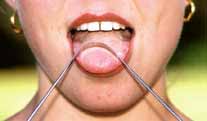|
HalitosisHow To Get Rid Of Bad Breathage-well.org > prevent age related disease > halitosis What is Halitosis?
Bad breath, or halitosis, is an unpleasant condition that leads to loss of self-confidence and anxiety. Although sometimes the problem may result from what we eat or poor oral care, it is often a symptom of more serious health issues and could indicate that the sufferer has an infection or disease. One way of making sure that our breath is sweet is to make sure that we clean our teeth and gums thoroughly before bed, in the morning and after every meal. Supplement this with flossing to remove plaque and any food particles, which may get stuck between the teeth and start to rot, causing mouth odors. Massaging the gums with special wooden sticks manufactured for this purpose will also help to make them strong and avoid gum disease. Review our page on oral hygiene to make sure that you are keeping your teeth and gums as healthy as possible. Attention should also be paid to cleaning the tongue as bad odors can be caused by the proliferation of the friendly bacteria which is present on the tongue of humans, but which can occasionally cause problems of this type. Cleaning your tongue’s surface regularly with a tongue scraper is the best way of dealing with this problem Dietary Habits and HalitosisCertain foods can also lead to problems with bad breath. Alcohol can dry out the mouth and often exacerbates halitosis problems. Sugar can also over-stimulate the bacteria on your tongue, as can coffee, citrus juices and other acidic food. Sugar is an additional problem for people who have diabetes or pre-diabetes but, in any case, too much sugar should be avoided as it can lead to serious health problems. Dairy products can also cause bad breath in people who are lactose intolerant and, it goes without saying, should also be avoided for this reason, among others. Dry MouthSaliva helps to keep the friendly bacteria in our mouths in check. When the mouth becomes dry these friendly bacteria can sometimes proliferate and react with certain foods that we eat to cause unpleasant mouth odors. Bad breath may become more of a problem as we get older, because often the mucus of the mouth can become dry as we age. This is often a problem with women after the menopause, but might also be a symptom of other conditions or be a side effect of medication. Other CulpritsProblems in the mouth, such as gumboils and abscesses, ulcers, and diseases like gingivitis and periodontal disease, are obvious triggers for halitosis. Allergies, sinus congestion, ear infections and upper respiratory tract infections can also be the cause of mouth odors. Problems with the digestive system can also cause bad breath. Invest in Your HealthIf none of the above seem to be causing your halitosis, it may be necessary to seek medical advice, as your doctor may need to investigate further to find the cause of your mouth odor problems. In any case, a visit to your dentist is recommended at least once a year to check that everything is in order. Regular health checks are also advisable as you age and problems with bad breath can be raised during these visits. Your health is your greatest asset and is worth investing in. age-well.org > prevent age related disease > halitosis Top of Halitosis |
Translate this Site
Search this Site
List of Conditions
|
Alcoholic Liver
|
|
Alzheimers Disease
|
|
Arterioslerosis
|
|
Age-Related Cancer
|
|
Cataracts
|
|
Cholesterol
|
|
Colds and Flu
|
|
Depression
|
|
Diabetes
|
|
Dementia
|
|
Dry Eye
|
|
Enlarged Prostate
|
|
Fibromyalgia
|
|
Glaucoma
|
|
Hair Loss
|
|
Halitosis
|
| Heart Attack
|
| Herniated Disc
|
|
High Blood Pressure
|
|
Incontinence
|
|
Influenza
|
|
Lower Back Pain
|
|
Macular Degeneration
|
|
Menopause
|
|
Osteoarthritis
|
Osteoporosis
|
|
Parkinson's Disease
|
|
Peri-Menopause
|
|
Presbycusis
|
|
Presbyopea
|
|
Prediabetes
|
|
Sarcopenia
|
|
Stroke
|
|
Shingles
|
|
Swineflu
|
Develop Smart Habits
|
Lose Extra Weight
|
|
Lose Bellyfat
|
|
Quit Smoking
|
|
Reduce Alcohol
|
|
Get Enough Sleep
|
|
Eat Healthily
|
|
Cut Down on Salt
|
|
Cut down on sugar
|
|
Avoid Transfats
|
|
Follow the DASH Diet
|
|
Drink Plenty of Water
|
|
Exercise Regularly
|
|
Manage Stress
|
|
Get Your 5 a Day
|
| Eat a Healthy Breakfast
|
|
Get Enough Calcium
|
|
Practice Good Oral Hygiene
|
|
Think Positive
|
Healthy Digestion
|
The Digestive System
|
|
The Intestines
|
|
Prevent Constipation
|
About this Site







